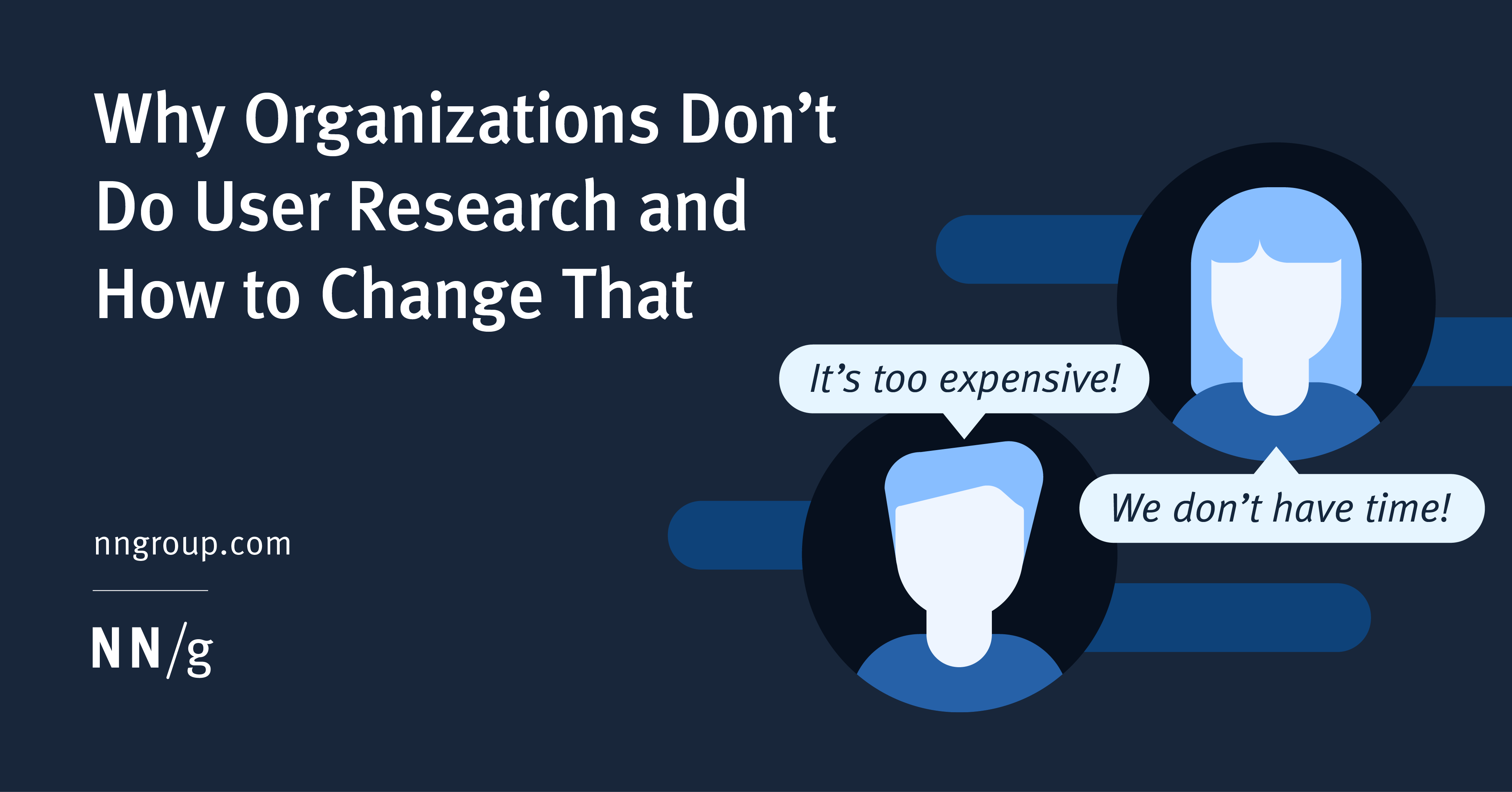Talk to users!

When did your organisation last do any user research? When did you last talk to real people?
How do the answers to those questions feel?
I know that I've worked with organisations where the answer make me feel uneasy - Where the answer can be summarised as; "It's been way too long". Even worse is an answer that makes me grimace; "We don't need to".
An organisation with an immature research practice will find all kinds of excuses to avoid user research. It's too difficult, time consuming, expensive. Or they lean on alternative methods, such as "We have analytics", or "We A/B test". Some may even fear the results.
But none of these are good excuses.
Laura Klein gives some great tips in this article about how to address specific excuses: Why Organizations Don’t Do User Research and How to Change That.
If you do manage to crack the surface and move beyond the initial excuses, the next challenge is maintaining that momentum and help a team that understands the value of user research (or design research, or UX research) to do more.
In those situations, I've found that providing a reminder of when they last talked to users can be surprisingly powerful, and nudge organisations towards making research happen more often.
When I first deployed this tactic, I wrote it as a number in the corner of a whiteboard. The team would see it each day during our daily stand-ups. We could see the number grow, and it enabled us to discuss the status of our next planned user research session.
Today, with distributed teams and remote working, a physical whiteboard is a challenge to drag around - So I've created a small web-based tool to help you:
Talk to users is a simple tool that, at its most basic, lets you choose a date that answers the question "When did we last talk to users?" and see how many days have passed.
Setting targets
You can also set a target - A number to compare your progress against. If you are doing better than your target (an acceptable number of days have passed since your last user research), then a tick will be shown. If you are missing your target (too many days have passed since your last user research), then a cross will be shown.

Start by going into settings and entering a number of days that doesn't make you feel uneasy. Something that feels achievable. For example, your team could agree to do some user research and talk to real people at least once a month - So your target would be to keep days since to below 28.
Then once you've had a few cycles where you've seen nothing but a green tick, then start moving it down - perhaps lower your target by a week (7 days) at a time. If you're experiencing a lot of days looking at Talk To Users and seeing a red cross, then you should increase your target for a while.
Stretch goals
If you want to set yourself something a bit more challenging, then I've included a number of additional "Days since" questions that you can enable in the settings.
These challenge you to broaden your research, and remind you of groups that might be overlooked - at least initially as your research practice matures.
How many days is it since you talked to...
- A user in another country
It's easy to get "stuck" in the country you are based, or overlook that you have a user or customer base outside of that country. - A user we didn’t already know
Who hasn't tested something on a friend, or their Mum? - A user who has a disability
If there's one of these extra block I'd encourage you to enable, it's this one. - A user who has a temporary disability
Again, it's often overlooked that not all disabilities are permanent. I might have hurt my hand, or got an eye infection, not slept well - or simply carrying a child. - Someone who isn’t a user anymore
Ex-users can inform you about so much more than just the off-boarding experience. - Someone who has never been a user
First time users give you the opportunity to research without the recognition and recall effects of experienced users. - Someone in your customer service team
This is the "quick win", the block to activate to give you a more simple target to meet, yet still can generate valuable insights.

When are you done?
If you are regularly experiences weeks between occasions when you've met, observed, or interviewed people then your organisation is probably under informed.
If you are talking directly to users every week, real users (synthetic users via an AI tool don't count!) then I think you're probably done with this tool.
If you are regularly talking to people that fall into all of the alternative "days since" groups, then seriously, you're totally done - our conversation can move on to the next level of maturity, where rather than "days since" we can look at ensuring research is conducted throughout the different stages of the development or product lifecycle.
You've suceeded in moving from having an emergent process, to having something structured.
So, to help you on your user research journey, use the Talk to users tool as a way to help build momentum, strengthen your user research routines, and close the gap between your team and users - helping you to make better, evidence-based, decisions.
Talk to people, talk to users! 🔍
Update 20251023
I've create a Swedish version of Talk to users: Prata med användare!
I decided to use the subdomain "dagarsedan" (days since) as "pratamedanvandare" is just too clunky and long in Swedish. Other than that, the tool is exactly the same.
References




